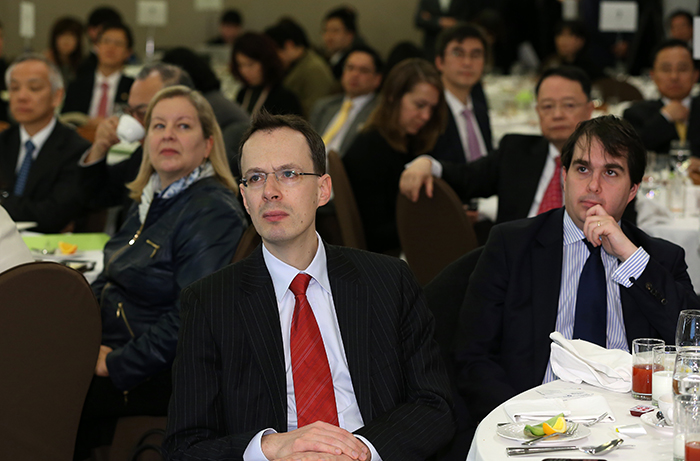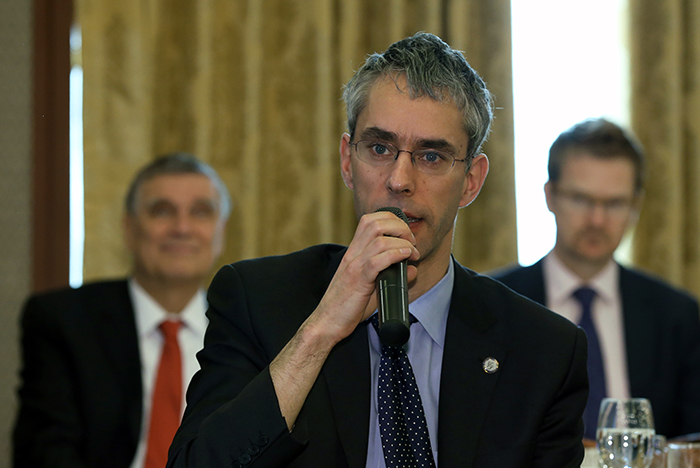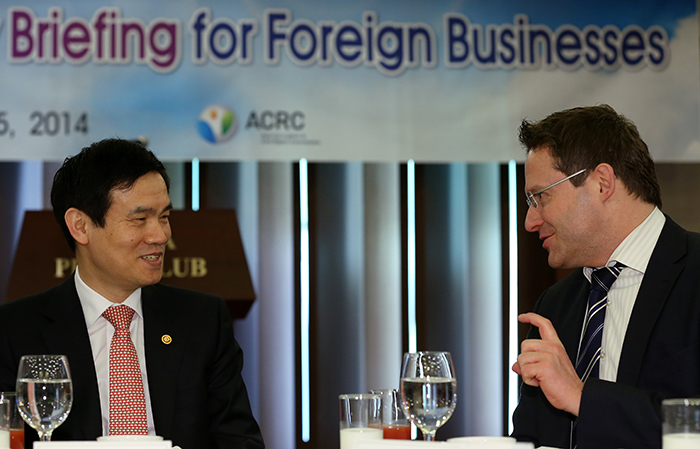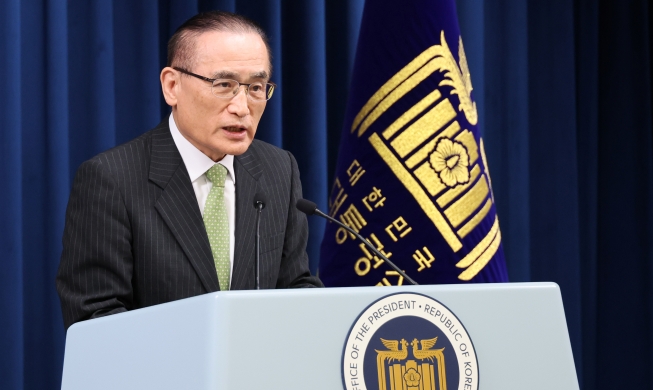“When the anti-corruption policy efforts of the Anti-Corruption & Civil Rights Commission are carefully examined, the corruption perception index (CPI) is expected to rise drastically,” said Lee Sungbo, chairperson of the Anti-Corruption & Civil Rights Commission (ACRC), in a meeting with heads of foreign businesses in Korea.
At the seventh policy meeting with CEOs of foreign companies, on March 5, Lee explained the country’s anti-corruption policies and plans for the year 2014. Some 50 CEOs and executives, and representatives of foreign business associations and embassies, took part in the meeting and discussed difficulties they face in doing business in Korea.

Lee explained in detail a pending bill that bans illegal solicitation and prevents public servants from having a conflict of interest and he confirmed the government’s determination to fight corruption.
“The bill toughens existing codes of conduct for public servants and creates effective measures, including penalties, fines and punishments, to establish strict public discipline,” Lee said.
Foreign business leaders present at the meeting took great interest in the underlying intent and reason for the bill and sympathized with the need for the legislation.

During the Q&A session held between policy briefings, Christoph Heider, secretary general of the European Chamber of Commerce and Industry in Korea (EUCCK), said, “I have taken great interest in the ACRC’s anti-corruption policies. The policies have been very successful, but why do you think the country’s CPI is on the decline now?”

“As you know, the CPI is used to study the perception of potential corruption,” Lee said. “It does not take into account actual corruption that has occurred.”
“There is also a large gap between the time when the survey took place and the point when the results were announced,” Lee said. “For example, the Bertelsmann Transformation Index (BTI) has contributed much to a drop in the 2013 CPI, compared to that of 2012. The 2013 index was measured over two years, from February 2011 to February 2013. The BTI declined by eight points compared to the previous survey. This drop is attributed to fraud committed by close aides to the president in the previous administration and to owners and heads of conglomerates. The CPI was announced at the end of 2013 and many people and media outlets believed that the result reflects the evaluation of the current administration. That is not true.
“What I am concerned with is that the BTI used in the 2013 CPI is also reflected by Transparency International (TI), whose numbers are going to be announced at the end of this year,” he said.

In addition to an explanation of the ACRC’s anti-corruption policies, there were discussions about difficulties faced by foreign businesses in Korea and suggestions to alleviate them. The ACRC explained to participants how their requests made at previous meetings have been handled. Finally, the ACRC said it would reflect proposals made at this session in its future policies.
These meetings with foreign business leaders in Korea, organized by the ACRC, began in 2008 and have garnered interest from both foreign and domestic businessmen who are interested in the country’s anti-corruption policies.
By Jeon Han, Limb Jae-un
Korea.net staff writers
hanjeon@korea.kr

At the seventh policy meeting with CEOs of foreign companies, on March 5, Lee explained the country’s anti-corruption policies and plans for the year 2014. Some 50 CEOs and executives, and representatives of foreign business associations and embassies, took part in the meeting and discussed difficulties they face in doing business in Korea.

Lee Sungbo, chairperson of the Anti-Corruption & Civil Rights Commission (ACRC), introduces Korea’s anti-corruption policies during the commission’s seventh meeting with CEOs of foreign companies at the Press Center in central Seoul on March 5. (photo: Jeon Han)
Lee explained in detail a pending bill that bans illegal solicitation and prevents public servants from having a conflict of interest and he confirmed the government’s determination to fight corruption.
“The bill toughens existing codes of conduct for public servants and creates effective measures, including penalties, fines and punishments, to establish strict public discipline,” Lee said.
Foreign business leaders present at the meeting took great interest in the underlying intent and reason for the bill and sympathized with the need for the legislation.

Representatives of foreign companies and embassies listen to Korea’s anti-corruption policies presented by Chairperson Lee Sungbo of the ACRC, on March 5. (photo: Jeon Han)
During the Q&A session held between policy briefings, Christoph Heider, secretary general of the European Chamber of Commerce and Industry in Korea (EUCCK), said, “I have taken great interest in the ACRC’s anti-corruption policies. The policies have been very successful, but why do you think the country’s CPI is on the decline now?”

Christoph Heider, secretary general of the European Chamber of Commerce and Industry in Korea (EUCCK), asks a question about Korea’s corruption perceptions index (CPI). (photo: Jeon Han)
“As you know, the CPI is used to study the perception of potential corruption,” Lee said. “It does not take into account actual corruption that has occurred.”
“There is also a large gap between the time when the survey took place and the point when the results were announced,” Lee said. “For example, the Bertelsmann Transformation Index (BTI) has contributed much to a drop in the 2013 CPI, compared to that of 2012. The 2013 index was measured over two years, from February 2011 to February 2013. The BTI declined by eight points compared to the previous survey. This drop is attributed to fraud committed by close aides to the president in the previous administration and to owners and heads of conglomerates. The CPI was announced at the end of 2013 and many people and media outlets believed that the result reflects the evaluation of the current administration. That is not true.
“What I am concerned with is that the BTI used in the 2013 CPI is also reflected by Transparency International (TI), whose numbers are going to be announced at the end of this year,” he said.

ACRC Chairperson Lee talks with MAN Truck & Bus Korea CEO Thilo Halter at the meeting. (photo: Jeon Han)
In addition to an explanation of the ACRC’s anti-corruption policies, there were discussions about difficulties faced by foreign businesses in Korea and suggestions to alleviate them. The ACRC explained to participants how their requests made at previous meetings have been handled. Finally, the ACRC said it would reflect proposals made at this session in its future policies.
These meetings with foreign business leaders in Korea, organized by the ACRC, began in 2008 and have garnered interest from both foreign and domestic businessmen who are interested in the country’s anti-corruption policies.
By Jeon Han, Limb Jae-un
Korea.net staff writers
hanjeon@korea.kr

